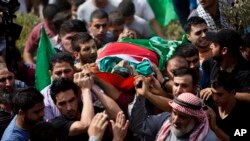Israeli Prime Minister Benjamin Netanyahu says there are no limits on Israeli security forces as they confront a surge in Palestinian violence.
"We are allowing our forces to take strong action against those who throw rocks and firebombs," Netanyahu said just before an emergency security cabinet meeting Monday. "We are not prepared to give immunity to anybody, not to any rioter...or any terrorist anywhere."
He has already said that demolitions of terrorists' homes will be speeded up and terror suspects jailed without trial.
Meanwhile, Palestinian President Mahmoud Abbas met with his security team Monday, urging them to prevent an escalation in violence and not play into the hands of the Israeli government.
In the latest incident Monday, Israeli forces shot and killed two teenage Palestinians who were throwing stones in the West Bank. Israeli police also arrested five Palestinians accused in last week's drive-by shooting death of an Israeli couple.
Violence between Israeli forces and Palestinians has grown in the past week, primarily over the the east Jerusalem holy site revered by Muslims as the al-Aqsa mosque and Jews as the Temple Mount.
Under a long-standing agreement, Israel controls the site but gives Muslims the right to visit and worship. Jews can visit, but are not allowed to pray there
Palestinians have accused Israeli authorities of trying to restrict them from visiting the site, leading to Palestinian rock throwing and attacks on Jewish visitors.
In response, Israeli police say men 50 years and younger will not be allowed in the al-Aqsa mosque.
Sunday, Israeli police shot and killed a Palestinian who stabbed and wounded an Israeli teen outside the Old City. A day earlier, a Palestinian attacked an Israeli family near the al Aqsa mosque, killing the father with a knife and wounding his wife and toddler son.
Some Israelis and moderate Palestinians are worried the surge in violence is the first sign of another Palestinian uprising.
Tough talk from Netanyahu and Abbas and continued Israeli settlement activity in the West Bank are making the chances of a negotiated peace and two-state solution between Israel and the Palestinians appear even more remote.





